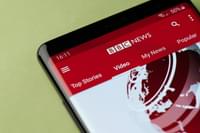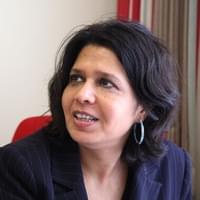
Reliable news is still the BBC's forte, despite what some may say
As many continue to question the BBC's impartiality, Huw Merriman MP writes that the BBC is in fact maintaining its tradition of reliable news and coverage, and we should be grateful for it and its initiatives in the fight against fake news.
In this strange and febrile world of social media, potentially dangerous information spreads like wildfire at the touch of a button. Never has this been more pertinent than in the context of the COVID-19 pandemic, which has seen shockingly factually inaccurate content dispersed as fact; from claims COVID-19 vaccines are human tracking systems, to denying the grave threat of the virus. We must all make the conscious decision to rely on impartial and trustworthy news.
The pandemic has underlined that audiences turn to the BBC when it matters most. It is no surprise that 81 per cent of people in the UK are acutely aware of the misinformation hazard and are turning to trusted news providers, such as the BBC, for the true picture. The UK average audience of the BBC News at Six was regularly over 5 million adults throughout 2020, the largest regular audience for almost 20 years.
As chair of the All-Party Parliamentary Group for the BBC, I am under no illusions that critics from across the political spectrum advocate that the organisation is politically biased. Those on the left protest that the Corporation's commentary and reporting is too right-leaning, and those on the right complain that it is too left-leaning. The fact that the BBC fails to please either side may itself prove the BBC's impartiality. I've often found that many have their antennae up, and react, only to that which goes against what they believe.
The appetite for reliable news has never been higher and this extends far beyond our borders. The BBC's huge role in exporting British values is often overlooked but, in my view, should be a source of immense national pride. Indeed, the BBC ranks first for trust, independence and reliability amongst international news providers.
Over the course of the pandemic, the BBC's Reality Check has exposed potentially life-threatening false claims about catching and curing COVID to audiences around the world, including in places where people do not have access to other trusted news. British values are currently reaching 438 million people though the BBC's global news services and the BBC is the world's top English language news website.
As ever, this trust brings great responsibility. Impartiality is enshrined in the BBC's Royal Charter and the Corporation's new Director-General has rightly pushed it to the front of the agenda, introducing new impartiality guidelines for journalists and staff, new social media rules, new rules on declaration of interests on top of impartiality training. While I am a passionate believer in the importance of impartiality for democracy, social cohesion and greater understanding, I am in no doubt that the battle is on. While audiences value impartial news, research shows that around a third (32%) think that all news is biased whatever the source and only 38% trust most news the majority of the time.
There are also big gaps in the reach of trusted providers. Fact-checking services skew to an already engaged audience and many of those most adversely affected by fake news, such as the Capitol rioters or anti-vaxxers, are not seeing anti-disinformation interventions. The BBC's recent proposals to better reflect all of the UK and ensure an even great diversity of voice will be essential to bridging that gap and the Corporation should be supported in this endeavour to ensure all of the nation is represented and heard.
A welcome development is the establishment of the BBC's Trusted News Initiative. This will maximise their convening power to facilitate a partnership of leading global players from the news industry and biggest tech platforms, including Facebook, Google, Microsoft, Reuters, the Financial Times. The fast alert system has seen partners informed about the most dangerous disinformation the moment it arises, so it doesn't get spread further. This has been extremely useful during both UK and US elections, alongside tackling harmful COVID conspiracy theories.
The threat to the BBC's universality, via its licence fee, could be argued to be a threat to impartial news itself. The unique way the BBC is funded means it is independent from outside interference and is accountable to those who fund it through the licence fee.
I am in no doubt that only the BBC has the reach, scale and trusted brand to fight fake news at local, national and global level, and to fly the flag for British values worldwide.

Huw Merriman is the Conservative MP for Bexhill and Battle and Minister of State for Rail and HS2.








